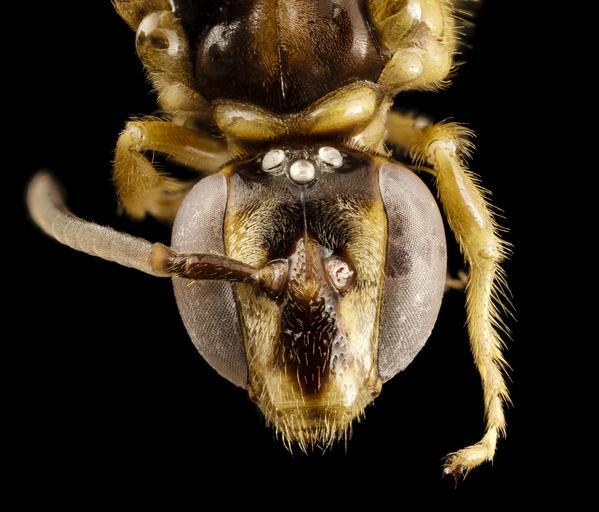MAKE A MEME
View Large Image

| View Original: | bee_pale_tan,_f,_colombia,_face_2014-08-08-16.54.39_ZS_PMax.jpg (3687x3150) | |||
| Download: | Original | Medium | Small | Thumb |
| Courtesy of: | www.flickr.com | More Like This | ||
| Keywords: bee bees biml usgs apoidea droege usgsbiml stackshot zerene stacker zerenestacker taxonomy:genus=osiris columbia south america southamerica sting stinger atlatl black background animal texture Osiris, Atlatl Godbee, Collected in Colombia The ancient Egyptian God Osiris was associated with both the afterlife and a greenish skin, and at least indirectly with Honey Bees. While early entomologists liked to demonstrate the depth of their knowledge naming genera according to classical Roman, Greek or, in this case Egyptian deities, the name in this case might be less inaccurate. This is because some Osiris species have a rather afterlifely pallid coloration sometimes verging on yellow-green. While there are 32 different species of Osiris, distributed from Mexico south to Argentina, almost nothing is known about the biologies of these nest parasites. There is one record of a young Godbee emerging from the nest of pollen carrying bees of the genus Paratetrapedia. Morphologically, the genus is notable for the length of its sting. It is not just the sting shaft that is elongate. The ventral part of the apical abdominal segment is developed into a long, almost tubular structure through which the sting can project. An interesting additional feature is the enormous development of what is, in almost all other bees, a tiny strut at the base of the sting shaft. In Osiris this forms a very elongate structure that looks like an atlatl or spear-thrower. Perhaps these remarkable embellishments serve to drive the sting home if the cuckoo should invade a nest while the rightful occupant is inside, or be caught in flagrante delicto by the returning mother. ~~~~~~~~~~{{{{{{0}}}}}}~~~~~~~~~~ All photographs are public domain, feel free to download and use as you wish. Photography Information: Canon Mark II 5D, Zerene Stacker, Stackshot Sled, 65mm Canon MP-E 1-5X macro lens, Twin Macro Flash in Styrofoam Cooler, F5.0, ISO 100, Shutter Speed 200 Further in Summer than the Birds Pathetic from the Grass A minor Nation celebrates Its unobtrusive Mass. No Ordinance be seen So gradual the Grace A pensive Custom it becomes Enlarging Loneliness. Antiquest felt at Noon When August burning low Arise this spectral Canticle Repose to typify Remit as yet no Grace No Furrow on the Glow Yet a Druidic Difference Enhances Nature now -- Emily Dickinson Want some Useful Links to the Techniques We Use? Well now here you go Citizen: Basic USGSBIML set up: www.youtube.com/watch?v=S-_yvIsucOY USGSBIML Photoshopping Technique: Note that we now have added using the burn tool at 50% opacity set to shadows to clean up the halos that bleed into the black background from "hot" color sections of the picture. www.youtube.com/watch?v=Bdmx_8zqvN4 PDF of Basic USGSBIML Photography Set Up: ftp://ftpext.usgs.gov/pub/er/md/laurel/Droege/How%20to%20Take%20MacroPhotographs%20of%20Insects%20BIML%20Lab2.pdf Google Hangout Demonstration of Techniques: plus.google.com/events/c5569losvskrv2nu606ltof8odo or www.youtube.com/watch?v=4c15neFttoU Excellent Technical Form on Stacking: www.photomacrography.net/ Contact information: Sam Droege sdroege@usgs.gov 301 497 5840 Osiris, Atlatl Godbee, Collected in Colombia The ancient Egyptian God Osiris was associated with both the afterlife and a greenish skin, and at least indirectly with Honey Bees. While early entomologists liked to demonstrate the depth of their knowledge naming genera according to classical Roman, Greek or, in this case Egyptian deities, the name in this case might be less inaccurate. This is because some Osiris species have a rather afterlifely pallid coloration sometimes verging on yellow-green. While there are 32 different species of Osiris, distributed from Mexico south to Argentina, almost nothing is known about the biologies of these nest parasites. There is one record of a young Godbee emerging from the nest of pollen carrying bees of the genus Paratetrapedia. Morphologically, the genus is notable for the length of its sting. It is not just the sting shaft that is elongate. The ventral part of the apical abdominal segment is developed into a long, almost tubular structure through which the sting can project. An interesting additional feature is the enormous development of what is, in almost all other bees, a tiny strut at the base of the sting shaft. In Osiris this forms a very elongate structure that looks like an atlatl or spear-thrower. Perhaps these remarkable embellishments serve to drive the sting home if the cuckoo should invade a nest while the rightful occupant is inside, or be caught in flagrante delicto by the returning mother. ~~~~~~~~~~{{{{{{0}}}}}}~~~~~~~~~~ All photographs are public domain, feel free to download and use as you wish. Photography Information: Canon Mark II 5D, Zerene Stacker, Stackshot Sled, 65mm Canon MP-E 1-5X macro lens, Twin Macro Flash in Styrofoam Cooler, F5.0, ISO 100, Shutter Speed 200 Further in Summer than the Birds Pathetic from the Grass A minor Nation celebrates Its unobtrusive Mass. No Ordinance be seen So gradual the Grace A pensive Custom it becomes Enlarging Loneliness. Antiquest felt at Noon When August burning low Arise this spectral Canticle Repose to typify Remit as yet no Grace No Furrow on the Glow Yet a Druidic Difference Enhances Nature now -- Emily Dickinson Want some Useful Links to the Techniques We Use? Well now here you go Citizen: Basic USGSBIML set up: www.youtube.com/watch?v=S-_yvIsucOY USGSBIML Photoshopping Technique: Note that we now have added using the burn tool at 50% opacity set to shadows to clean up the halos that bleed into the black background from "hot" color sections of the picture. www.youtube.com/watch?v=Bdmx_8zqvN4 PDF of Basic USGSBIML Photography Set Up: ftp://ftpext.usgs.gov/pub/er/md/laurel/Droege/How%20to%20Take%20MacroPhotographs%20of%20Insects%20BIML%20Lab2.pdf Google Hangout Demonstration of Techniques: plus.google.com/events/c5569losvskrv2nu606ltof8odo or www.youtube.com/watch?v=4c15neFttoU Excellent Technical Form on Stacking: www.photomacrography.net/ Contact information: Sam Droege sdroege@usgs.gov 301 497 5840 | ||||